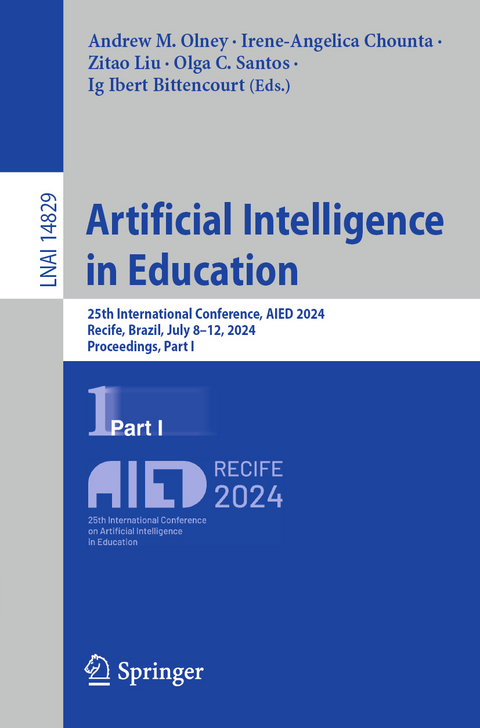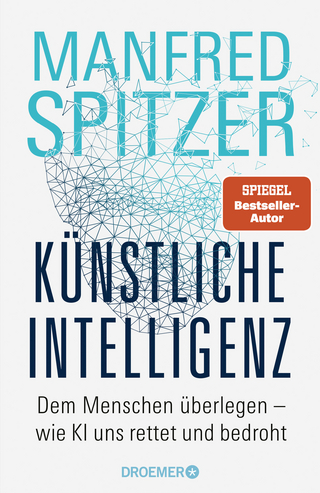
Artificial Intelligence in Education
Springer International Publishing (Verlag)
978-3-031-64301-9 (ISBN)
This book constitutes the refereed proceedings of the 25th International Conference on Artificial Intelligence in Education, AIED 2024, held in Recife, Brazil, in July 8-12, 2024, Proceedings.
The 49 full papers and 27 short papers presented in this book were carefully reviewed and selected from 334 submissions. The papers present results in high-quality research on intelligent systems and the cognitive sciences for the improvement and advancement of education.
.- From Learning Actions to Dynamics: Characterizing Students' Individual Temporal Behavior with Sequence Analysis.
.- Explainable Automatic Grading with Neural Additive Models.
.- PBChat: Enhance Student's Problem Behavior Diagnosis with Large Language Model.
.- Generating Situated Reflection Triggers About Alternative Solution Paths: A Case Study in Generative AI for Computer-Supported Collaborative Learning .
.- Automated Assessment of Encouragement and Warmth in Classrooms Leveraging Multimodal Emotional Features and ChatGPT.
.- Ruffle&Riley: Insights from Designing and Evaluating a Large Language Model-Based Conversational Tutoring System.
.- Knowledge Tracing Unplugged: From Data Collection to Model Deployment.
.- Grading Documentation with Machine Learning.
.- Supporting Teaching-to-the-Curriculum by Linking Diagnostic Tests to Curriculum Goals: Using Textbook Content as Context for Retrieval-Augmented Generation with Large Language Models.
.- VerAs: Verify then Assess STEM Lab Reports.
.- Evaluating the Effectiveness of Comparison Activities in a CTAT Tutor for Algorithmic Thinking.
.- Automated Long Answer Grading with RiceChem Dataset.
.- Knowledge Tracing as Language Processing: A Large-scale
Autoregressive Paradigm.
.- Can GPT4 Answer Educational Tests? Empirical Analysis of Answer Quality based on Question Complexity and Difficulty.
.- Understanding Gender Effects in Game-Based Learning: The Role of Self-Explanation.
.- Calcium regulation assignment: Alternative styles in successfully learning about biological mechanisms.
.- Who's helping who? When students use ChatGPT to engage in practice lab sessions.
.- Deep-IRT with a temporal convolutional network for reflecting students' long-term history of ability data.
.- How to Teach Programming in the AI Era? Using LLMs as a Teachable Agent for Debugging.
.- Improving the Validity of Automatically Generated Feedback via Reinforcement Learning.
.- Automatic Detection of Narrative Rhetorical Categories and Elements on Middle School Written Essays.
.- Marking: Visual Grading with Highlighting Errors and Annotating Missing Bits.
.- Jill Watson: A Virtual Teaching Assistant powered by ChatGPT.
.- Evaluating the Design Features of an Intelligent Tutoring System for Advanced Mathematics Learning.
.- Anticipating Student Abandonment and Failure: Predictive Models in High School Settings.
.- Beyond the Grey Area: Exploring the Effectiveness of Scaffolding as a Learning Measure.
.- Fairness of MOOC Completion Predictions Across Demographics and Contextual Variables.
.- EngageME: Exploring Neuropsychological Tests for Assessing Attention in Online Learning.
.- The Neglected 15%: Positive Effects of Hybrid Human-AI Tutoring Among Students with Disabilities.
.- Fine-tuning a Large Language Model with Reinforcement Learning for Educational Question Generation.
.- On Cultural Intelligence in LLM-based Chatbots: Implications for Artificial Intelligence in Education.
.- Leveraging Large Language Models for Automated Chinese Essay Scoring.
.- The Unexpected Effects of Google Smart Compose on Open-Ended Writing Tasks.
.- Teaching and Measuring Multidimensional Inquiry Skills using Interactive Simulations.
| Erscheinungsdatum | 02.07.2024 |
|---|---|
| Reihe/Serie | Lecture Notes in Artificial Intelligence | Lecture Notes in Computer Science |
| Zusatzinfo | XXXI, 501 p. 120 illus., 97 illus. in color. |
| Verlagsort | Cham |
| Sprache | englisch |
| Maße | 155 x 235 mm |
| Themenwelt | Informatik ► Theorie / Studium ► Künstliche Intelligenz / Robotik |
| Schlagworte | Collaborative Learning • computer-assisted instruction • Data Mining • E-Learning • Interactive Learning Environments • Knowledge Representation and Reasoning • machine learning • Natural Language Processing • Probabilistic Reasoning • Reinforcement Learning • Semantic networks • supervised learning • Unsupervised Learning |
| ISBN-10 | 3-031-64301-1 / 3031643011 |
| ISBN-13 | 978-3-031-64301-9 / 9783031643019 |
| Zustand | Neuware |
| Haben Sie eine Frage zum Produkt? |
aus dem Bereich


